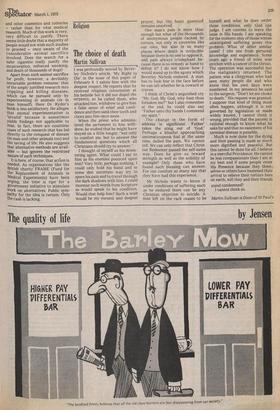Religion
The choice of death
Martin Sullivan
•
I was profoundly moved by Beverley Nichols's article, 'My Right to Die' in the issue of this paper of February 8. I salute him with the deepest respect. He reports that he received religious consolation at his bedside but it did not dispel the serpents, as he called them, who attacked him, withdrew to give him a false sense of relief and confidence and then sank their teeth and claws into him once more.
When the priest who administered the sacrament to him withdrew, he wished that he might have stayed on a little longer, "not only to comfort me, but to answer the fundamental questions which all Christians should try to answer."
I thought of myself as his ministering agent. What could I say to him as his enemies pounced upon him? Very little, perhaps nothing. I could only hold his hand and in some dim uncertain way try to spare his pain and to travel through the dark shadows with him. I could murmur such words from Scripture as would speak to his condition. Would that help him? Such a wish would be my earnest and deepest prayer, but the basic questiori remains unsolved.
One man's pain is more than enough but what of the thousands of anonymous people racked by torture, not only in countries like our own, but also in so many places where death is invincible because there is no one to oppose it, and pain always triumphant because there is no remedy at hand to defeat it? I do not know how I would stand up to the agony which Beverley Nichols endured. A man has to look fear in the face before he can tell whether he is coward or craven.
I think of Christ's anguished cry "My God, My God, why hast thou forsaken me?" but I also remember at the end, he could also say "Father unto thy hands I commend my spirit."
The change in the form of address is significant. 'Father' takes the sting out of 'God.' Perhaps a blissful approaching unconsciousness had at the same time, dulled the pain. We cannot tell. We can only reflect that Christ our Redeemer passed the self-same way. Does he give us inward strength as well as the nobility of example? Only those who have found such blessing can answer. For our comfort so many say that they have had this experience.
Mr Nichols wants to know if under conditions of suffering such as he endured there can be any Christian objection to suicide. A man left on the rack ceases to be
himself and what he does under those conditions, only God can judge. I am content to leave the issue in His hands. I am speaking for the moment only of those whose uninstigated suffering poses this problem. What of other similar cases? I cite one from personal knowledge and experience. Some years ago a friend of mine was stricken with a cancer of the throat. The operation was successful but the malignancy returned. The patient was a clergyman who had seen many people die and who knew that his own days were numbered. In my presence he said to the surgeon, "Don't let me choke to death." His request was granted. I suppose that kind of thing must often happen, although it is not governed by legislation or made widely known. I cannot think it wrong, provided that the patient is rational enough to know what he asks for and that no easement of his terminal disease is possible.
Much is now done for the dying and their passing is made so much more dignified and peaceful. But this cannot be done for all. I believe in a merciful Providence. He cannot be less compassionate than I am at my best and if some people enter His Presence because they them-, selves or others have hastened their arrival to relieve their torture here on earth, will they and their friends stand condemned? I cannot think so.
Martin Sullivan is Dean of St Paul's

































 Previous page
Previous page